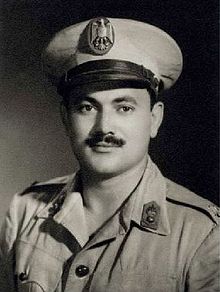Kamal el-Din Hussein

Kamal El-Din Hussein (Arabic: كمال الدين حسين; 2 January 1921 – 19 June 1999) was a member of the Egyptian Free Officers who overthrew King Farouk.[1]
Early life and education
[edit]Kamal El-Din Hussein was born in 1921 in Banha, Qalyubia.[2] He was admitted to military college in 1937. In 1939 he received the bachelor's degree of military science from the Egyptian Military Academy.[2] He served in the field artillery unit in the Western Desert, to fight with the British against the advancing army under Rommel in World War II.[1]
Political career
[edit]Hussein was a founding member of the Free Officers, and his rank was major during his membership to the group.[3] He was appointed member of the Egyptian Revolutionary Command Council after the 1952 Revolution. During the presidency of Gamal Abdel Nasser he was named the president of the teachers' syndicate.[4] He was also appointed minister of social affairs in 1954. He was named the minister of education in late 1957 following the elections in October.[5] In February 1958 he submitted his resignation from the ministry of education to Nasser due to the criticisms over the education policies, but it was not accepted by Nasser.[5]
Hussein led the National Guard to defend Ismailia during the Suez War. In 1964 he resigned from his post as vice president and minister of local governments. His main reason was the Egyptian intervention in the Yemen War. During Anwar El-Sadat's presidency he was elected in 1971 to the People's Assembly. After criticizing Sadat's government, he was dismissed from the People's assembly in 1978 and therefore also prevented from further elections. In 1983 he made a tour with Yasser Arafat through Arab countries to end hostilities between different Palestinian factions throughout the Arab world.
Death
[edit]Hussein was diagnosed with liver cancer. He died on 19 June 1999. His funeral was attended by the Egyptian President Hosni Mubarak.[1]
Awards
[edit]Hussein was the recipient of the Grand Collar of the Order of the Nile which was awarded to him in 1956.[6]
References
[edit]- ^ a b c Adel Darwish (23 June 1999). "Obituary: Kamal el-Din Hussein". The Independent. Retrieved 23 August 2009.
- ^ a b Zeinab El-Gundy; Karim Abdel Kodos (23 July 2015). "Meet the Free Officers of Egypt's Revolutionary Command Council". Ahram Online. Retrieved 7 July 2022.
- ^ Mahmud A. Faksh (June 1976). "Education and Elite Recruitment: An Analysis of Egypt's Post-1952 Political Elite". Comparative Education Review. 20 (2): 141. doi:10.1086/445878.
- ^ Robert Springborg (October 1978). "Professional Syndicates in Egyptian Politics, 1952-1970". International Journal of Middle East Studies. 9 (3): 282. JSTOR 162765.
- ^ a b Don Peretz (Winter 1959). "Democracy and the Revolution in Egypt". Middle East Journal. 13 (1): 34. JSTOR 4323083.
- ^ "Egypt" (PDF). Journal of the OMSA. 39.
External links
[edit] Media related to Kamel el-Din Hussein at Wikimedia Commons
Media related to Kamel el-Din Hussein at Wikimedia Commons
- 1999 deaths
- 1921 births
- Egyptian Military Academy alumni
- Egyptian military officers
- Egyptian revolutionaries
- Members of the House of Representatives (Egypt)
- Vice-presidents of Egypt
- Deaths from liver cancer in Egypt
- Arab Socialist Union (Egypt) politicians
- Free Officers Movement (Egypt)
- People from Benha
- Ministers of education of Egypt
- Egyptian people of World War II
- Military personnel of World War II
- Recipients of the Order of the Nile
